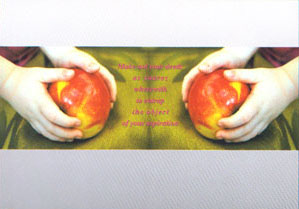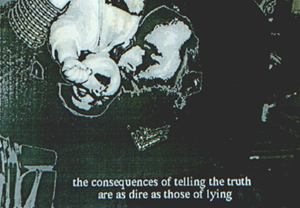In the woorden van Bahá'u'lláh, "Rechtvaardigheid is het meest geliefde van alle dingen".
Mijn foto/tekst-werken, Give and Take and The Consquences (Het Gevolg) gaan over rechtvaardigheid als het weten wanneer en hoe de juiste dingen te doen.
...Eens ga ik alles in nederlands overzetten...
The apple could be 'the snare', the material that is either
trapped or possessed but for me it is the 'giving and taking' that is really
the trap: our motive.
I chose a postcard as the form for this artwork because postcards are things
often given and received. Often as souveinirs of exchange rather than as
objects in themselves.
It is open ended whether the apple is given or taken, mirrored or doubled,
or the child's part in the transaction.
For me, justice, is about everyday acts, and not so much about heroic moments.
What happens when you give and take? Is that compromise or wisdom. Is that
what justice means? Is the child giving or taking, owning or offering?
|

Give and Take, 1995,
postcard, 10 x 15 cm.
Edition of 3000.
Stocks are limited.
See postcards
Tekst op kaart:
"Make not your deeds as snares
to entrap the object of your aspiration"
"Maak uw daden niet tot netten om het doel van uw verlangen in te verstrikken "
Bahá'u'lláh, Kitabi-i-Aqdás.
|
The text warns us to consider our motives, particularly when we do something
nice for someone. It warns of making something that is essentially spiritual
(trust / manaakitanga) into a possession, but that emphasis is on the positive:
it just says, be careful about your motive when you give. It's ironic that
we often think of justice in the context of injustice.
|

The consequences, 1998,
computer print, 10 x 15 cm.
Text:
the consequences of telling the truth
are as dire as those of lying.
|
In The consequences, a man kisses a baby, and the text warns us that
telling the truth is as risky as telling lies. By presenting this 'saying'
in this manner, the viewer is encouraged to question what is meant by 'truth',
and where is the 'risk' in what seems a harmless ordinary act.
The text comes from the novel,
To the Is-land by the New Zealand author, Janet Frame.
In both pieces I deal with the issue of justice from the perspective of
ethics and questions, because justice, at least in this day and age, is
much more complicated than the principle of an 'eye for an eye'.
|
![]() deel 1 deel 2 deel 3 deel 4 deel 6 deel 7 Sonja's c.v. Sonja's Design page Sonja'a art made in 1998
deel 1 deel 2 deel 3 deel 4 deel 6 deel 7 Sonja's c.v. Sonja's Design page Sonja'a art made in 1998



